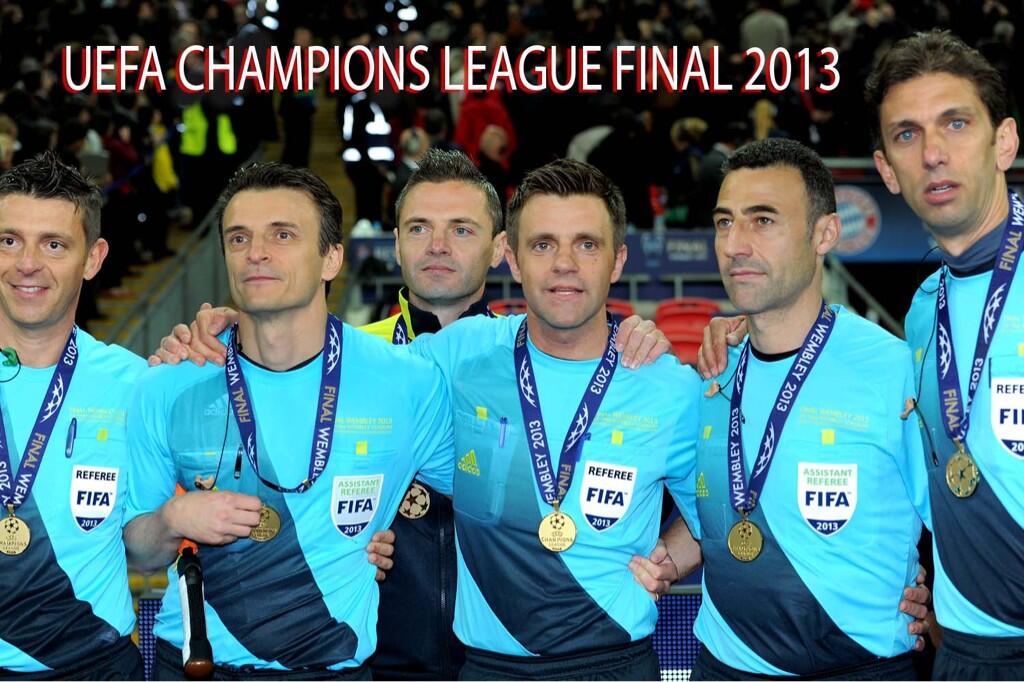Today, FIFA has unveiled the referee designations for June's World Cup qualifiers in UEFA zone including Slovenian Damir Skomina's assignment for the vitally important Group F clash between Portugal and Russia.
| Damir Skomina to oversee Portugal - Russia (c) ZIMBIO |
Group A
07 June 2013, 21:15 CET, Zagreb
Croatia – Scotland
Referee: David Fernández Borbalán (ESP)
Assistant Referee 1: Raúl Cabañero Martínez (ESP)
Assistant Referee 2: Jesús Calvo Guadamuro (ESP)
Fourth Official: Carlos Clos Gómez (ESP)
Group A
07 June 2013, 21:45 CET, Brussels
Belgium – Serbia
Referee: Stéphane Lannoy (FRA)
Assistant Referee 1: Frédéric Cano (FRA)
Assistant Referee 2: Michaël Annonier (FRA)
Fourth Official: Ruddy Buquet (FRA)
Group B
07 June 2013, 18:00 CET, Yerevan
Armenia – Malta
Referee: Arnold Hunter (NIR)
Assistant Referee 1: Eamonn Shanks (NIR)
Assistant Referee 2: Richard Storey (NIR)
Fourth Official: Mark Courtney (NIR)
Group B
07 June 2013, 20:45 CET, Prague
Czech Republic – Italy
Referee: Svein Oddvar Moen (NOR)
Assistant Referee 1: Kim Thomas Haglund (NOR)
Assistant Referee 2: Frank Andås (NOR)
Fourth Official: Svein Erik Edvartsen (NOR)
Group B
11 June 2013, 21:15 CET, Copenhagen
Denmark – Armenia
Referee: Aleksei Nikolaev (RUS)
Assistant Referee 1: Oleg Tselovalnikov (RUS)
Assistant Referee 2: Dmitry Mosyakin (RUS)
Fourth Official: Mikhail Vilkov (RUS)
Group C
07 June 2013, 20:45, Vienna
Austria – Sweden
Referee: Gianluca Rocchi (ITA)
Assistant Referee 1: Elenito Di Liberatore (ITA)
Assistant Referee 2: Gianluca Cariolato (ITA)
Fourth Official: Mauro Bergonzi (ITA)
Group C
07 June 2013, 20:45 CET, Dublin
Ireland – Faroe Islands
Referee: Mattias Gestranius (FIN)
Assistant Referee 1: Mikko Alakare (FIN)
Assistant Referee 2: Marko Hänninen (FIN)
Fourth Official: Dennis Antamo (FIN)
Group C
11 June 2013, 20:15 CET, Solna
Sweden – Faroe Islands
Referee: Nikolay Yordanov (BUL)
Assistant Referee 1: Ivan Valchev (BUL)
Assistant Referee 2: Veselin Dobriyanov (BUL)
Fourth Official: Stanislav Todorov (BUL)
Group E
07 June 2013, 17:30 CET, Geneva
Switzerland – Cyprus
Referee: Paolo Mazzoleni (ITA)
Assistant Referee 1: Mauro Tonolini (ITA)
Assistant Referee 2: Riccardo Di Fiore (ITA)
Fourth Official: Luca Banti (ITA)
Group E
07 June 2013, 20:30 CET, Tirana
Albania – Norway
Referee: William Collum (SCO)
Assistant Referee 1: William Conquer (SCO)
Assistant Referee 2: Martin Cryans (SCO)
Fourth Official: Robert Madden (SCO)
Group E
07 June 2013, 21:00 CET, Reykjavik
Iceland – Slovenia
Referee: Felix Zwayer (GER)
Assistant Referee 1: Detlef Scheppe (GER)
Assistant Referee 2: Mike Pickel (GER)
Fourth Official: Christian Dingert (GER)
Group F
07 June 2013, 19:00 CET, Baku
Azerbaijan – Luxembourg
Referee: Mihaly Fabián (HUN)
Assistant Referee 1: István Albert (HUN)
Assistant Referee 2: Peter Berettyan (HUN)
Fourth Official: Sándor Andó-Szabó (HUB)
Group F
07 June 2013, 22:45 CET, Lisbon
Portugal – Russia
Referee: Damir Skomina (SVN)
Assistant Referee 1: Matej Žunič (SVN)
Assistant Referee 2: Bojan Ul (SVN)
Fourth Official: Slavko Vinčič (SVN)
Group G
07 June 2013, 18:30 CET, Riga
Latvia – Bosnia-Herzegovina
Referee: Mike Dean (ENG)
Assistant Referee 1: Stuart Burt (ENG)
Assistant Referee 2: Peter Kirkup (ENG)
Fourth Official: Martin Atkinson (ENG)
Group G
07 June 2013, 20:45 CET, Vilnius
Lithuania – Greece
Referee: Olegário Benquerença (POR)
Assistant Referee 1: Ricardo Santos (POR)
Assistant Referee 2: João Santos (POR)
Fourth Official: Manuel De Sousa (POR)
Group G
07 June 2013, 21:00 CET, Vaduz
Liechtenstein – Slovakia
Referee: Martin Strömbergsson (SWE)
Assistant Referee 1: Henrik Andrén (SWE)
Assistant Referee 2: Daniel Gustavsson (SWE)
Fourth Official: Martin Hansson (SWE)
Group H
07 June 2013, 20:15 CET, Chisinau
Moldova – Poland
Referee: Fernando Teixeira Vitienes (ESP)
Assistant Referee 1: Victoriano Díaz Casado (ESP)
Assistant Referee 2: Teodoro Sobrino Magán (ESP)
Fourth Official: Javier Estrada Fernández (ESP)
Group H
07 June 2013, 21:30 CET, Podgorica
Montenegro – Ukraine
Referee: Manuel Gräfe (GER)
Assistant Referee 1: Thorsten Schiffner (GER)
Assistant Referee 2: Guido Kleve (GER)
Fourth Official: Florian Meyer (GER)
Group I
07 June 2013, 18:00 CET, Helsinki
Finland – Belarus
Referee: Eli Hacmon (ISR)
Assistant Referee 1: Shabtai Nahmias (ISR)
Assistant Referee 2: Dvir Shimon (ISR)
Fourth Official: Menashe Masiah (ISR)
Group I
11 June 2013, 19:00 CET, Gomel
Belarus – Finland
Referee: Libor Kovarik (CZE)
Assistant Referee 1: Krystof Mencl (CZE)
Assistant Referee 2: Jiri Molaček (CZE)
Fourth Official: Radek Matejek (CZE)


